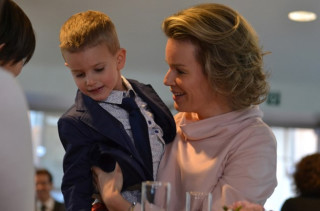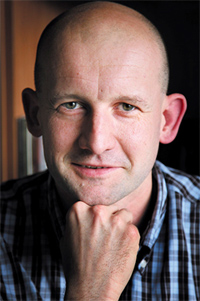Marnix Verley, now four years old, is probably too young to realize it. But when his mother Lesley was pregnant with him, she was diagnosed with breast cancer. His parents faced the difficult choice between terminating the pregnancy and treating the cancer with chemotherapy. Advised by Dr. Frédéric Amant, they opted for treatment, and, after six rounds of chemo, Lesley was able to give birth to a perfectly healthy son.

Belgian Queen Mathilde with Marnix, whose mother was treated with chemotherapy when she was pregnant with him. Image courtesy of hsb and published first in Nieuwsblad.be
Celebrating 10 years of research
Dr. Amant has been studying cancer and pregnancy for 10 years, a decade during which he has assembled a team of nine medical specialists working together at the University Hospital Gasthuisberg in Leuven, Belgium. In order to celebrate the 10-year anniversary of his study, he organized the symposium “Cancer in young women” on February 5 and 6, 2015.
The opening presentation of the symposium was given by Dr. Amant himself, in the presence of Belgian Queen Mathilde, a long-time supporter of the research into cancer and pregnancy in Leuven.
But support for the research was not always a given. To the audience of doctors from various fields of expertise, Dr. Amant outlined the incredible journey that has been made over the last years. A journey that started in 2005, when he treated a pregnant woman who had been diagnosed with cancer. Over the course of her treatment, the medical team realized there was almost no information available on treatment options.
What followed was a long and tedious process of trying to secure research funding, only to find out that people were very hesitant to fund research on pregnant women. But the research team started anyway, and after 10 years there have been 47 publications, some of them in world-leading medical journals such as The Lancet. Gradually, as progress became apparent, funding started coming in. It was worth taking the risk, Dr. Amant shared.
Chemotherapy during pregnancy
 The main conclusion, all presenters at the symposium agree, is that if chemotherapy is given after the first trimester of the pregnancy, there are no adverse consequences for the baby and no additional risks of malformations at birth. While it may seem counterintuitive – after all, we discourage substances such as alcohol and nicotine during pregnancy – it has been established that the placenta filters out the chemotherapy and prevents the toxins from reaching the fetus.
The main conclusion, all presenters at the symposium agree, is that if chemotherapy is given after the first trimester of the pregnancy, there are no adverse consequences for the baby and no additional risks of malformations at birth. While it may seem counterintuitive – after all, we discourage substances such as alcohol and nicotine during pregnancy – it has been established that the placenta filters out the chemotherapy and prevents the toxins from reaching the fetus.
The research unit is currently following 108 children whose mothers received chemotherapy, and these children do not show any more developmental disorders than “normal” children. But as Sileney Han, who defended her PhD thesis the night of the event, stressed, the baby’s health is not the only concern: the mother’s well-being matters just as much. Dr. Han compared 311 pregnant women that suffered from breast cancer with 865 non-pregnant women that developed breast cancer and concluded that survival rates were the same for both categories.
In short, cancer treatment during pregnancy is safe for both mother and child. A much bigger danger, however, is premature birth. On average, a child’s IQ drops 2.5 points for every week it was born too early. If the mother’s condition allows it, the goal should therefore always be delivering the baby at 37 weeks at least.
Opening eyes
The findings of Dr. Amant’s team have radically altered the way some medical experts think about cancer treatment during pregnancy. But as he stresses, despite these findings, there are still many doctors out there that remain hesitant to prescribe chemotherapy during pregnancy – in particular the US remains very cautious.
Creating more awareness is crucial, and the symposium certainly contributed to this. There were 550 attendees, some of who were medical professionals that had travelled the world to attend.
International cooperation is one of the main priorities of the research group
It has set up the International Network on Cancer, Infertility and Pregnancy in order to enable doctors across the globe to share their data.
The presence of the team’s former patients, such as Lesley Verley and her son Marnix, anchors the story Dr. Amant’s is telling in reality and makes it much more powerful. Having a chance to see the happiness of both mother and child – the direct result of the research – can turn the ivory tower numbers into understanding and sympathy with the public at large. To raise awareness, Lesley’s husband Andy wrote a book on their experiences, the title translates to “Our chemobaby.”
Many other conference attendees were medical students at the Leuven Royal University. This gives hope for the future, as a new generation of doctors becomes aware of the possibilities for treating cancer during pregnancy.
Leading the way
Although much progress has been made, there is still a long way to go. There is a clear need for centralization of care and a multidisciplinary approach. As Dr. Han observed, it can take up to 17 specialists, ranging from oncologists to pediatricians and from gynecologists to Without centralization, hospitals will not be able to give pregnant mothers the care they need when they develop an illness.
Looking to the future, Dr. Amant also aims to tackle broader problems than cancer during pregnancy. The studies carried out over the last decade have opened up new avenues for research on other uses of medicine during pregnancy, which remains a much-understudied topic. Just as it did 10 years ago, Leuven leads the way on this research area. And just as it was then, many doctors and medical organization are still reluctant to support research on medicine use during pregnancy out of fear of hurting the fetus.
Dr. Amant, however, remains optimistic. His closing message: “there is a long way to go. But never give up on something you truly believe in.”

